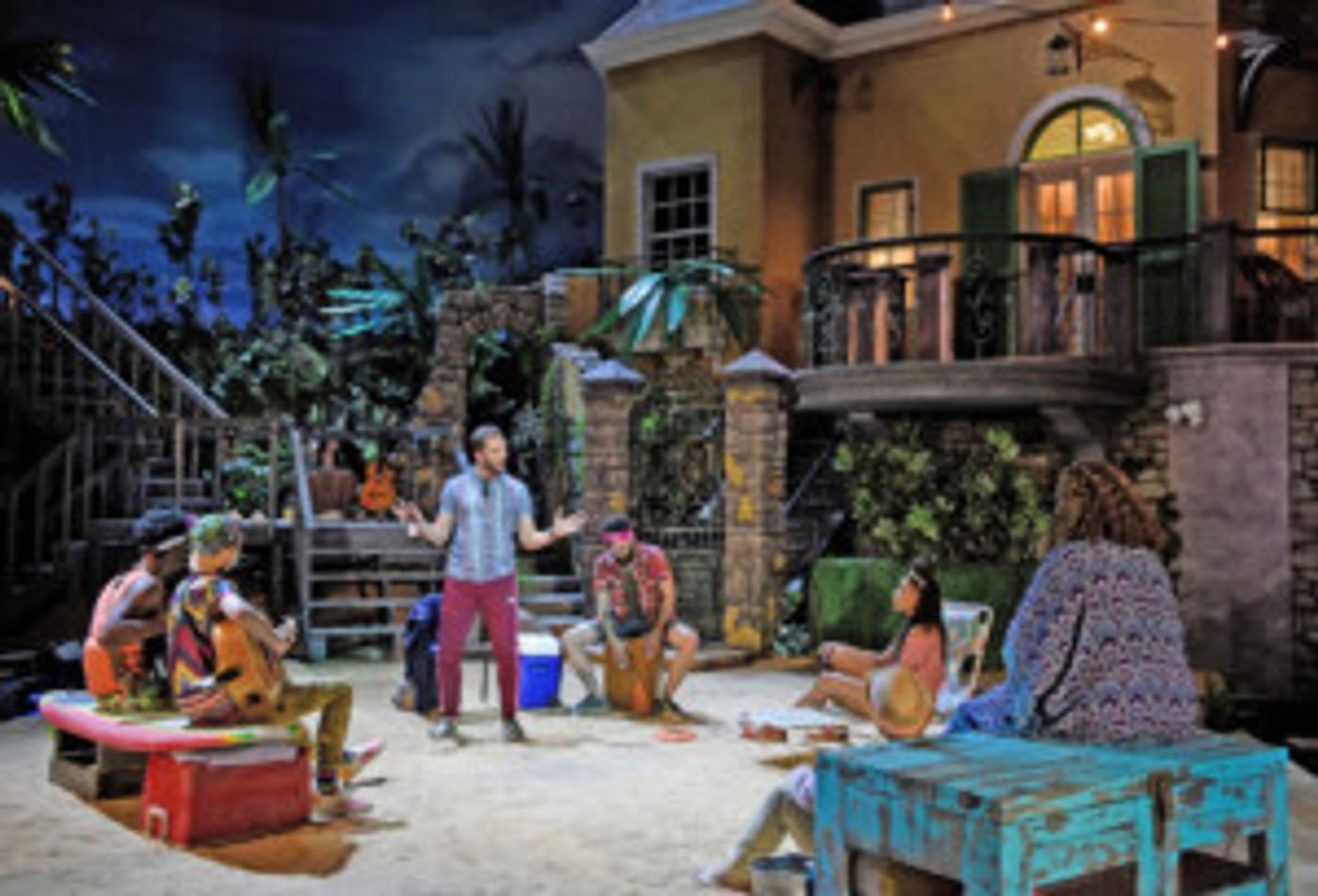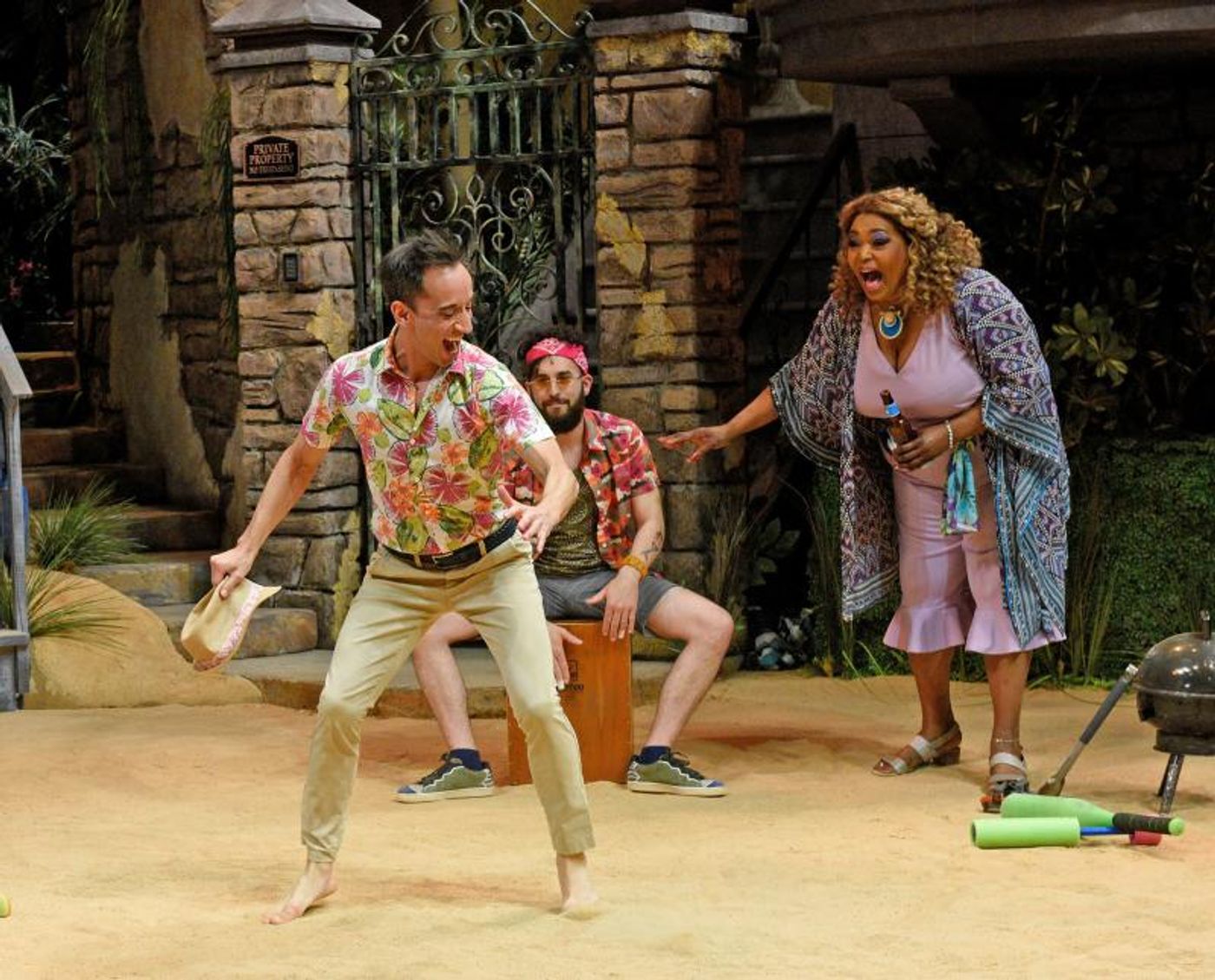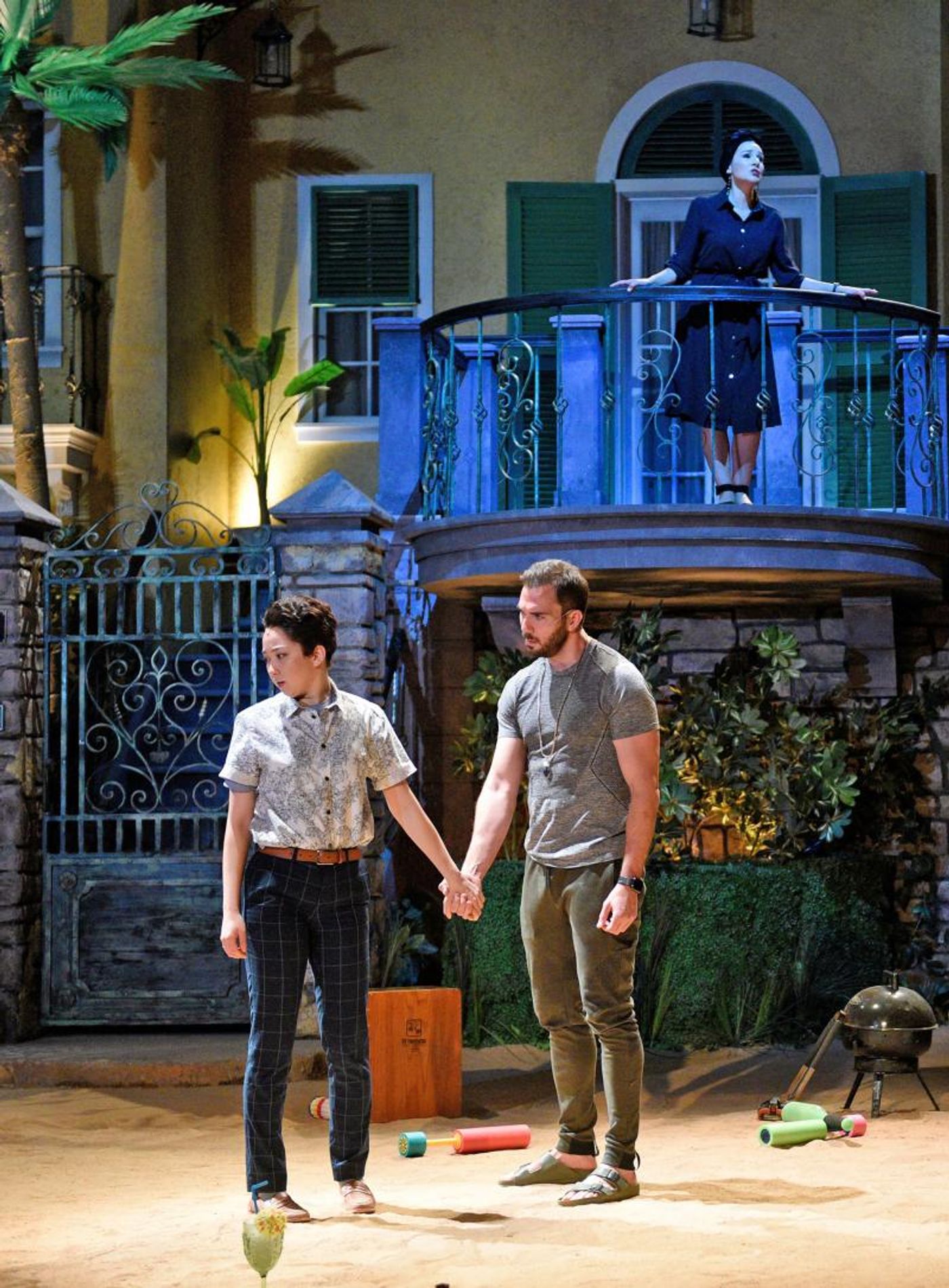Review: TWELFTH NIGHT Conjures a Comedic Oasis at Dallas Theater Center

In my final semester of college, I took a "Bad Shakespeare" seminar in which the professor guided us through the Bard's plays that have become a bit more problematic in recent decades: TAMING OF THE SHREW, MERCHANT OF VENICE, OTHELLO, etc. One day I asked her why, with all of its gender confusion and bawdy humor, she didn't plan on teaching us TWELFTH NIGHT. Surely there must be something "bad" in it.
"Well I would," she said, without missing a beat, "but it's a perfect play."
If you find yourself needing proof of her statement, you need look no further than Dallas Theater Center's current production of TWELFTH NIGHT, running through April 28 at the Dee and Charles Wyly Theatre.
One of Shakespeare's most beloved comedies, TWELFTH NIGHT opens with Viola crawling ashore after having survived a shipwreck that she believes killed her brother. In need of money, she disguises herself as a man named Cesario and becomes employed by the Duke Orsino. Viola finds herself falling in love with Orsino though he is in love with the Countess Olivia who refuses his advances. When Viola/Cesario goes to intercede on Orsino's behalf, Olivia falls in love with Viola/Cesario thinking her to be a man. Comedy ensues, and that's to say nothing yet of the play's several hilarious subplots.
Audience members skeptical of or intimidated by Shakespeare have nothing to fear here. Artistic Director Kevin Moriarty has brilliantly directed and designed his production to be accessible to newcomers and seasoned patrons alike. Casting has been simplified, consolidating numerous secondary characters and clowns into three musicians who provide the audience with brief explanations of major plot points in between scenes (in contemporary English). This also keeps the play moving at a brisk pace, timing out at ninety minutes with no intermission, though you'll want to stay for the afterparty. Most importantly, without exception, this ensemble cast demonstrates a deep understanding of and immersion in Shakespeare's language and style. The actors' line delivery hits the ear like a familiar melody, allowing viewers to understand the sense of what has been spoken even if they may not fully grasp the substance.
Moriarty also brings plenty of intrigue to his production, bringing subtextual elements of the script to the front and center. The homoerotic - if not outright homosexual - relationships between Viola/Cesario and Orsino and Viola/Cesario and Olivia are explored in greater depth than they might have been in Shakespeare's own time. But this produces enhanced excitement for the audience while raising the stakes of the play's love triangle as well. What does it mean that Orsino finds his attraction to Cesario stronger than his attraction to Olivia? What does it mean that Viola gives in to Olivia's advances? How does gender both liberate the characters and entrap them? Questions such as these have long been debated by scholars, so it is refreshing to see that Moriarty is bringing his audiences into the conversation.
It also helps that TWELFTH NIGHT is raucously, subversively funny. Olivia's beachside mansion is inhabited by her Aunt Toby (Liz Mikel), Toby's friend Sir Andrew (Blake Hackler), and her faithful maid Maria (Tiana Kaye Blair). Mikel brings a larger-than-life charisma to the chronically drunk Toby as she leans on audience members to let them in on a dirty joke or sprays water pistols over the first three rows of the auditorium. She's accompanied in nearly every scene by Hackler, who plays Sir Andrew with a flamboyant agitation that frequently caused viewers to laugh so intensely that it took several moments for the scene to resume. Whether he was crawling between the aisles or "capering" in the sand, Hackler's every appearance was cause for delight. All three of the above-mentioned performers have a wicked sense of comedic timing, instinctively knowing how to lead audiences through the play's many twists and turns.
 Of course, these three clowns need a straight man to play off of, and the script provides them with this in the character of Malvolio, Olivia's utterly humorless and devoutly religious manservant played by Alex Organ. Fed up with Malvolio's constant nagging, Toby, Andrew, and Maria develop a scheme to convince the servant that Olivia is in love with him. Organ's height and chilly demeanor make him an imposing figure that audiences can't help but love to hate, and he delivers many of his early lines with humor as dry as the sand he walks on. However, Organ also excels in portraying ecstatic excitement, casting off his character's self-imposed restraints and reveling in newfound freedom with such abandon that one of his monologues drew roaring applause upon its conclusion.
Of course, these three clowns need a straight man to play off of, and the script provides them with this in the character of Malvolio, Olivia's utterly humorless and devoutly religious manservant played by Alex Organ. Fed up with Malvolio's constant nagging, Toby, Andrew, and Maria develop a scheme to convince the servant that Olivia is in love with him. Organ's height and chilly demeanor make him an imposing figure that audiences can't help but love to hate, and he delivers many of his early lines with humor as dry as the sand he walks on. However, Organ also excels in portraying ecstatic excitement, casting off his character's self-imposed restraints and reveling in newfound freedom with such abandon that one of his monologues drew roaring applause upon its conclusion.
The play's main love triangle makes up most of TWELFTH NIGHT's plot, though, and the actors who make up this triangle are as adept at conveying profoundly complex emotions as they are at drawing laughs. As Duke Orsino, David Matranga subverts any notions audiences may have about the lovesick character. Certainly, Matranga seeks out Olivia's love with a bright smile and gleaming eyes, but he also imbues his character with a deeply conflicted psyche as he discovers that he is both intoxicated and unnerved by his attachment to Cesario. Tiffany Solano DeSena similarly grapples with desires both spoken and unspoken as Olivia. Physically and emotionally guarded at the play's beginning, her Countess slowly opens up with a surprised delight in finding a world of wonder after having been in mourning for her brother's death. DeSena's very sighs are breathtaking and speak to a pleasure that may be indistinguishable from pain.
 None of these characters would know any of these joys were it not for the arrival of Viola, played by Delphi Borich in what should be considered a standard-defining performance. Like Mikel and Hackler, Borich consistently maintains great comic instincts, delivering her funniest lines with an easygoing irony that becomes subtly unsettled as her gender-swapped plot begins to go awry. Borich's Viola proceeds confidently and with strength, focusing on the character's deliberate choice to build a new life for herself rather than spend any time mourning the life taken away from her. Most impressively, and perhaps most tragically, is her intense compassion for everyone she meets on the coast. Audiences never doubt that Viola deeply cares for the feelings and wellbeing of both Orsino and Olivia, a fact that makes this production's ending more bittersweet - yet paradoxically more satisfying - than most other productions would dare.
None of these characters would know any of these joys were it not for the arrival of Viola, played by Delphi Borich in what should be considered a standard-defining performance. Like Mikel and Hackler, Borich consistently maintains great comic instincts, delivering her funniest lines with an easygoing irony that becomes subtly unsettled as her gender-swapped plot begins to go awry. Borich's Viola proceeds confidently and with strength, focusing on the character's deliberate choice to build a new life for herself rather than spend any time mourning the life taken away from her. Most impressively, and perhaps most tragically, is her intense compassion for everyone she meets on the coast. Audiences never doubt that Viola deeply cares for the feelings and wellbeing of both Orsino and Olivia, a fact that makes this production's ending more bittersweet - yet paradoxically more satisfying - than most other productions would dare.
If these incredible performances make up a party of a production, TWELFTH NIGHT's design team has provided Moriarty and his cast with the perfect venue. Scenic designer Anna Louizos brings her Tony-nominated talent back to Dallas, turning the Wyly Theatre into the perfect secluded beach hideaway. Much of the backdrop is taken up by Olivia's imposing yet inviting mansion, complete with a balcony overlooking the sandy playing area below. The audience will find themselves caught up in this oasis as well, seated in several rows of assorted beach chairs while cast members meander through with charming familiarity. Clifton Taylor's lights and Andrea Allmond's sound design create exquisite effects for the raging storm that opens the show while also creating a warm and intimate atmosphere for the festivities that take place afterward.
Though we may not be finding ourselves stranded on a beach, we might all be facing our own personal shipwrecks right about now. The beauty of Dallas Theater Center's TWELFTH NIGHT is that it provides a shelter from such storms, inviting us in to reflect on how we overcome these struggles while still learning to delight in the maddening, hilarious unpredictability of life.
"If good art be the food of love," to paraphrase Duke Orsino, "party on."
Photo Credit: Karen Almond
Reader Reviews
Videos

